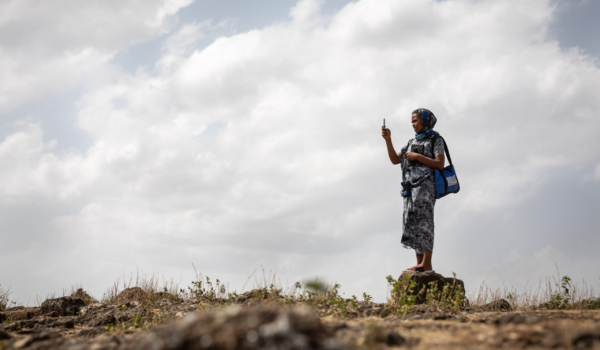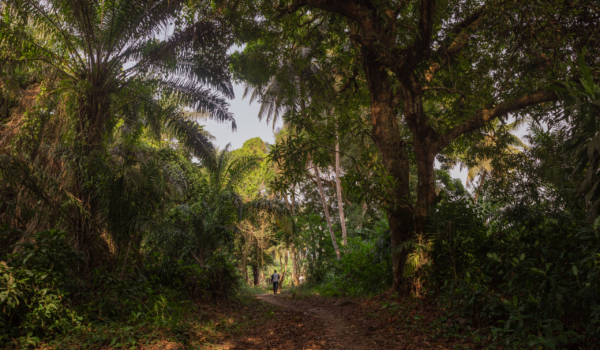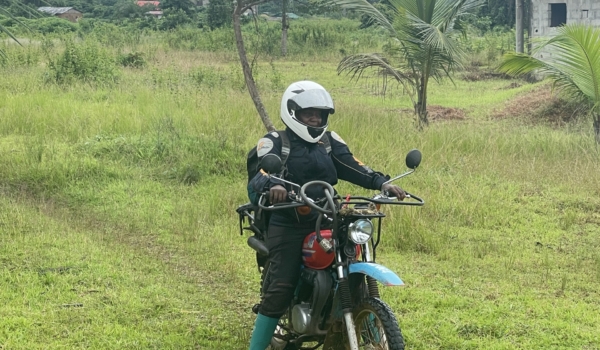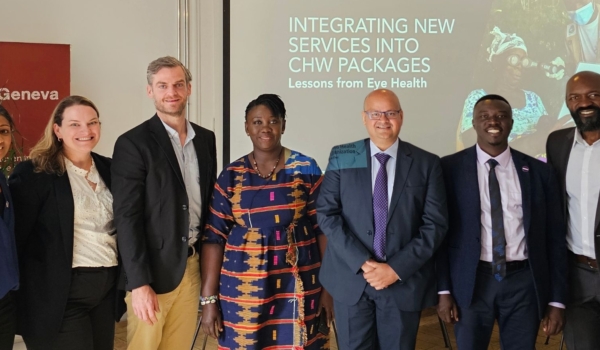In honor of World Health Worker Week, Last Mile Health spoke with Aaron Kaleso, a community health worker, known locally as health surveillance assistant, who works in the catchment area of Bereu Health Centre in Chikwawa District, Malawi. This conversation has been edited for clarity and length.
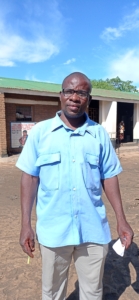
Aaron Kaleso
Last Mile Health (LMH): Aaron, thank you for speaking with us today. Can you tell us more about yourself?
Aaron Kaleso (AK): My name is Aaron Kaleso. I am 39 years old, and I was born on the 4th of December 1982 in Kasungu District. Here I am today working as a health surveillance assistant, but I still have ambitions to become a medical doctor someday.
LMH: What motivated you to become a CHW?
AK: When I was young and anytime I had the opportunity to visit the hospital, I was inspired to see doctors providing services to the patients. I feel so sorry when I see patients going too long before they can get assistance from health workers. So at the time I really wished I could just grow fast and become a health worker. I am so delighted that at the end, I still work with the Ministry of Health and specifically the Community Health Section.
Since 2007 until now, I have been serving under Bereu Health Centre. I am now working at Piyasoni catchment area. My catchment area has a population of 2,350.
LMH: How does it make you feel when connecting with the community you serve? What does it mean to you?
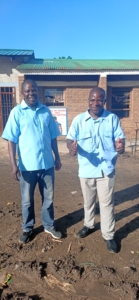
Aaron Kaleso with his Supervior, Dennis Nkuna, at Bereu Health Centre
AK: The service I am providing to my community here is the same level of service I would provide to my relatives. I am committed to delivering on the work that I am passionate about. I think God blessed me with compassion to serve Malawians.
I work very well with the community, and have integrated well with the people. A community health worker is supposed to be exemplary when executing the work in the community. In addition to being a leader, it is important to be humble and speak to people with humility when serving the community members or patients.
LMH: How do you typically plan or prioritize your workday?
AK: Our responsibilities include developing a monthly work program, which includes activities like supporting clinics, doing door-to-door visits, and sensitizing the community. We therefore develop a workplan that features all these activities and the frequency within a month. For example, during this time of COVID-19 vaccination, the senior health surveillance assistant would provide guidance and bring more people to support. We divide and conquer to make sure that nothing suffers.
LMH: How has your work been impacted by the COVID-19 pandemic?
AK: COVID-19 affected our work greatly. When we had a COVID-19 outbreak in December 2019, it brought in a lot of challenges and problems to us as community health workers. As you know, COVID-19 spreads too quickly, and some of us got sick from the disease. Even some of the people in the community also got sick. We could not operate effectively because we also feared catching the virus in the line of duty.
It was hard to operate, as you can imagine, during the lockdowns as gatherings were not allowed. Our messages are delivered through community gatherings, which meant that we couldn’t deliver any preventive information to the community. Therefore, it was difficult to interact with the people.
LMH: What do people from your catchment areas say about the COVID-19 vaccine? Are you seeing an appetite for the vaccine from the community?
AK: Community health workers did not have enough information at first to respond effectively to questions and rumors around the COVID-19 vaccine. The community believes in their community health workers as a channel to receive health information and act on it. Since we got involved to support community mobilization for vaccination, we are trying our best to communicate the benefits of receiving a vaccine.
At the moment the reception of the vaccine in my community is good. Recently, I engaged with local leaders, members of the village development committees, and chairpersons of the health committees to inform them of a program to extend the COVID-19 vaccine to the community in accordance with the training and expertise we got from Last Mile Health. From that training, I went ahead to engage the community to dispel the rumors. I shared COVID-19 booklets published in the local language. The community was mobilized to receive the vaccine. In my community we vaccinated 75 people, including pregnant women.
I have received both doses of the vaccine. The community asks me frequently if I am vaccinated. I got the first dose at the district hospital and got the second dose right here at the clinic.
LMH: Recently the district has also been affected by another disaster, Cyclone Ana. How has this impacted you and the communities you serve?
AK: We have been greatly affected by the cyclone. Some of the health workers’ houses were destroyed by the heavy winds and flooding. Community members have lost their houses, businesses, livestocks, and many other things. When a health worker is affected in such a storm, service delivery is disrupted and it takes time for things to be normalized. We experienced the storm between the 25th and 26th of February. There was water everywhere, including inside the clinic. Health services were suspended for two weeks, which meant no clinics for children under five, no COVID-19 vaccinations, and all other health services were stopped and interrupted.
Recently, all the health workers were mobilized to come to the facility for general cleaning. Now we are getting back to normal business but we are still affected by many things, including the efficacy of vaccines due to temperature changes.
LMH: What is the most rewarding part of your job?
AK: I will give you one scenario. One day, I referred a community member to Chikwawa District Hospital who presented with an eye problem. On return to the community, this patient brought me a letter from a clinician encouraging me to continue referring patients to the main hospital. Even the man thanked me for saving his eyes. I felt encouraged that I am really helping save people’s lives. It shows that the work of community health work is recognized and that we are important people in the health system.
LMH: What are your hopes for the future?
AK: Personally, like I said, I have always wanted to be a medical doctor. I want to continue to pursue my ambition by going back to school to qualify for medical school.
Professionally, I would like to make sure that the people in my community have good health to effectively contribute to the development of Malawi. Government and all partners need to put more muscle and priority on the health of the people. There is no good development with poor health, and the starting point should be improving the health of the people in the community and moving upwards. All the patients that we see in our facilities are from the community. If we can invest in community health, we can have a Malawi free from malaria, free from diarrhea, and free from many other conditions.
LMH: If you could share one message with the world during World Health Worker Week, what would it be?
AK: I would like to thank and acknowledge the excellent work that community health workers are doing across the world by providing the first level of health services right in the communities where people live. During this week, we need to acknowledge their commitment, their hard work, and the lives they have saved.
I also would like to highlight the gaps we are facing while doing our work. Firstly, as community health workers, we serve a huge population. This has an impact on our ability to provide quality care. I would like to use this opportunity to ask our governments and other non-governmental organizations to consider increasing the number of community health workers. For example, in my community, I serve a population of 2,153 people when I should serve a population of 1,000 people.
Secondly, I know that some community health workers are operating without protective wear and other equipment to help them perform their job well. We need simple things like gloves and other protective equipment, especially during this COVID-19 pandemic, to ensure our own safety.
Lastly, I believe it’s now time to consider a review of the salary package for community health workers around the world. I appreciate that salaries cannot be the same, but I am calling on governments to at least provide enough to community health workers so that we are able to meet our daily needs.

